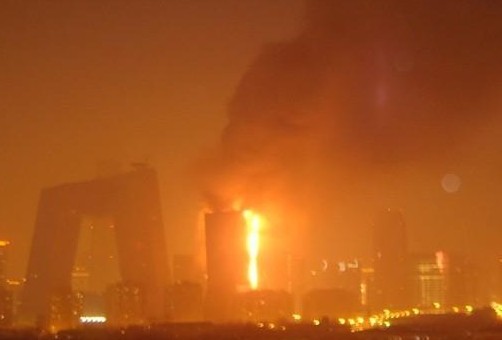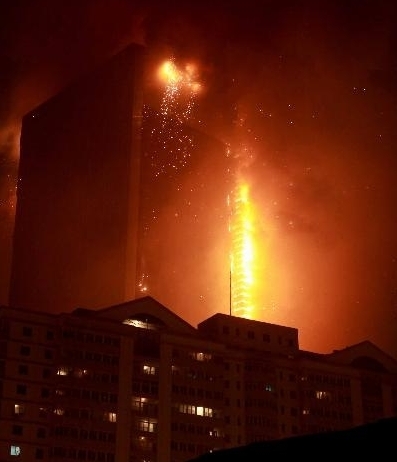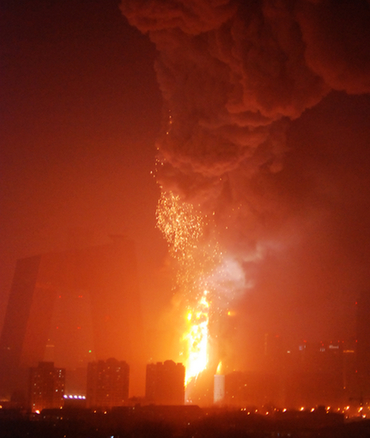 |
|
Located near Jingguang Bridge road, a newly-built structure within China's Central Television compound is ablaze in Beijing at 9 p.m. on Monday, February 9, 2009. Traffic police are controlling traffic around nearby roads.
|
A hotel adjacent to the new China Central Television (CCTV) headquarters in Beijing caught fire Monday night.
 Watch the fire engulf 40-story luxury hotel
Watch the fire engulf 40-story luxury hotel
As of 0:45 a.m. Tuesday, the fire has been under control, but blaze could still be seen on upper floors, witnesses said.
A fireman died from injuries incurred while fighting the massive fire. A spokesman with the Beijing Fire Control Bureau said Zhang, 30, inhaled toxic gas and his respiratory tract was seriously injured while he worked to put out the fire.
Six other people were injured in the blaze, including five firemen and a CCTV worker. Chaoyang Hospital's vice president Hou Shengcai said their injuries were not life-threatening.
Initial investigation showed that the fire had been caused by illegal launches of firecrackers, said a spokesman with the Beijing Municipal Government.
Firefighters found remnants of firecrackers on the southern roof of the burning building.
The fire razed more than 100,000 square meters. An atrium and a digital computer room in the building were burnt down.
The 159-meter building, the Mandarin Oriental Hotel, is 200 meters away from the iconic CCTV main tower and part of the complex.
The hotel was used during the Olympics, but the hotel won't officially open until mid-2009. Witnesses said some lights had been on in the hotel.
 |
|
Located near Jingguang Bridge road, a hotel adjacent to China's Central Television compound is ablaze in Beijing at 9 p.m. on Monday, February 9, 2009. Traffic police are controlling traffic around nearby roads.
|
As Monday is China's traditional Lantern Festival, the end of the Lunar New Year holiday, fireworks were being set off nearby.
A young man who declined to be identified said the fire had apparently started at about 8:25 p.m. Monday, when firecrackers landed on the top of the building. Police couldn't immediately confirm that account.
The man, who claimed he had worked with the construction company that built the hotel, said he saw someone on watch on the CCTV main tower with a hose when firecrackers were set off. "But I didn't see any on top of the hotel," he added.
Beijingers had to stop selling or lighting fireworks in the urban area of the capital as of midnight Monday, and explosives were banned within Beijing's Fifth Ring Road. The area within that road is considered the urban area.
More than 1,000 people in the area were evacuated and traffic controls were imposed around the scene and on the east Third Ring Road, one of several major highways that encircle the capital.
Service on the Number 10 subway line was temporarily halted.
"It is horrible," said a woman surnamed Chang, who lives on the19th floor of an apartment building about 1 kilometer from the CCTV complex.
"There is thick black smoke and high flames. At first we just saw fire on top of the building, but now it is entirely engulfed," she said.
"The building was used during the Olympic Games, but the companies moved out afterwards," said a CCTV staff member surnamed Chen, adding that he didn't know whether there were still people in the building.
Firefighting was hampered by height of the building, as water from the hoses could at most reach 40 meters high.
Beijing is dry during the season, as the city has not seen any rainfall in 106 days.
Witnesses said that the flame was about 80 meters at one time.

Snow-like ashes fell as far as 1 km from the building and smoke eclipsed the full moon.
The 241-room luxury facility, in the heart of the capital's Central Business District, was intended to be Mandarin Oriental's flagship property in China.
The first and second floors were used to make programs during the Beijing Olympic Games.
Chen said that they were expected to move in after October. Before the fire broke out, the interior was being decorated.
Liu Yunshan, head of the Communist Party of China Central Committee Publicity Department, Beijing's Party chief Liu Qi and Beijing Mayor Guo Jinlong rushed to the scene.
The hotel was designed by Dutch architect Rem Koolhaas, whose other work, the CCTV tower, was listed as one of the wonders of Chinese architecture by US-based Business Week magazine and viewed as the most radical structure in the country.
The tower, with a floor space of 495,900 square meters, is composed of two segments, 234 meters and 194 meters high, respectively, which lean six degrees. They were joined in December 2007.
The huge project, for which the foundation was laid in September 2004, finally won the central government's approval 18 months after it had been halted due to worries about over-heated property investment as well as traffic congestion fears.